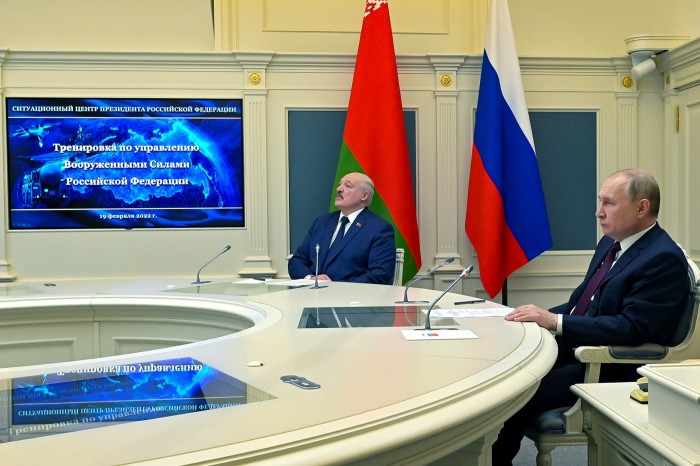US threatens crippling sanctions if Russia invades Ukraine

US vice-president Kamala Harris said the west would impose “unprecedented economic costs” on Russia if it invaded Ukraine, amid warnings it could attack its western neighbor in a matter of days.
Addressing the Munich Security Conference, she said the world was seeing “the playbook of Russian aggression”, with Moscow creating false pretexts for invasion while amassing troops and firepower in plain sight.
“We now receive reports of what appears to be provocations and we are seeing Russia spreading disinformation, lies and propaganda,” Harris told the annual conference of political leaders, diplomats and senior military figures in the Bavarian capital.
As Russia began strategic nuclear exercises on Saturday, she warned the west would impose “far-reaching financial sanctions and export controls” against Moscow should President Vladimir Putin give the order to attack Ukraine.
“We will target Russia’s financial institutions and key industries and we will target those who are complicit and those who aid and abet this unprovoked invasion,” the vice-president said.
“Make no mistake, the imposition of these sweeping and co-ordinated measures will inflict great damage on those who must be held accountable,” she said.
This year’s Munich conference has been dominated by the tense situation on the Ukrainian border where Russia has amassed more than 130,000 troops, and the threat of a new war in the heart of Europe.
US president Joe Biden said on Friday he was convinced Putin had made a decision to invade Ukraine. After a call with transatlantic leaders about what he described as a “rapid escalating crisis”, Biden accused Moscow of creating a pretext for an assault on its neighbor that he said could begin “in the coming week, in the coming days”.
Putin ordered the start of strategic nuclear exercises on Saturday which US officials have interpreted as a show of strength by Moscow to Nato.
Though the Kremlin said the exercises should not “give anyone cause for. . . concern ”, the last time they were moved to February from their usual autumn timeframe was shortly before Russia invaded Crimea in 2014.
Russian state media showed Putin and Belarusian leader Alexander Lukashenko in a Kremlin command center as the military launched ballistic and cruise missiles, as well as new hypersonic weapons.
Leaders addressing the Munich conference appealed to Russia to step back from the brink and give diplomacy a chance.
“Of course I have no illusions – we shouldn’t expect quick successes,” said Olaf Scholz, the German chancellor. “But we will only be able to break through the dynamic crisis if we negotiate.” “If diplomacy fails, it will not be our fault,” he added.
Jens Stoltenberg, Nato secretary-general, told the Munich conference it was “not too late” for Russia “to change course, to step back from the brink, stop preparing for war and start working for a peaceful solution.”
Stoltenberg said that “despite Moscow’s claims, we are seeing no sign of withdrawal or de-escalation so far.”
“We call on Russia to do what it says and withdraw its forces from the borders of Ukraine,” he said.
Scholz said the troop build-up had “no justification” and Russia’s attempt to turn Ukraine’s possible membership of Nato into a “casus belli” was a “paradox”, because the issue was not on the west’s agenda.
Ursula von der Leyen, the European Commission president, told the conference that the west was “facing a blatant attempt to rewrite the rules of international order”.
“One only has to read the recent communique issued by Russian and Chinese leaders,” she said. “They seek a new era – to replace the existing international rules. They prefer the rule of the strongest to the rule of law, intimidation instead of self-determination, coercion instead of co-operation. ”
Stoltenberg agreed that “the current crisis is about more than Ukraine”. “Moscow is attempting to roll back history and recreate its spheres of influence,” he said.
Western fears of an impending Russian attack on Ukraine grew sharply on Friday amid what Biden called “phoney allegations” of an impending offensive by Kyiv’s forces in the eastern Donbas region of Ukraine, which is partially controlled by pro-Russian separatists.
Separatist leaders announced a mass evacuation of civilians to Russia and called on all fighting-age men to mobilize in local armed forces. Rebels claimed an unspecified number of people had been killed in “terror attacks” they blamed on Ukrainian forces.
The investigative website Bellingcat said timecodes on the separatists’ video appeals were dated Wednesday – before the uptick in shelling in Donbas began – adding to suspicions that Russia had started a false flag operation as a pretext to invade Ukraine.
Maria Zakharova, Russia’s foreign ministry spokeswoman, accused western countries of ignoring what she said were rampant human rights abuses in the region against Donbas natives, hundreds of thousands of whom have been given Russian passports during the eight-year conflict.
“Our country will never tire of opposing evil. We are on the right side of history, and facts confirm that every time, ”she wrote on the messaging app Telegram.
Source link





